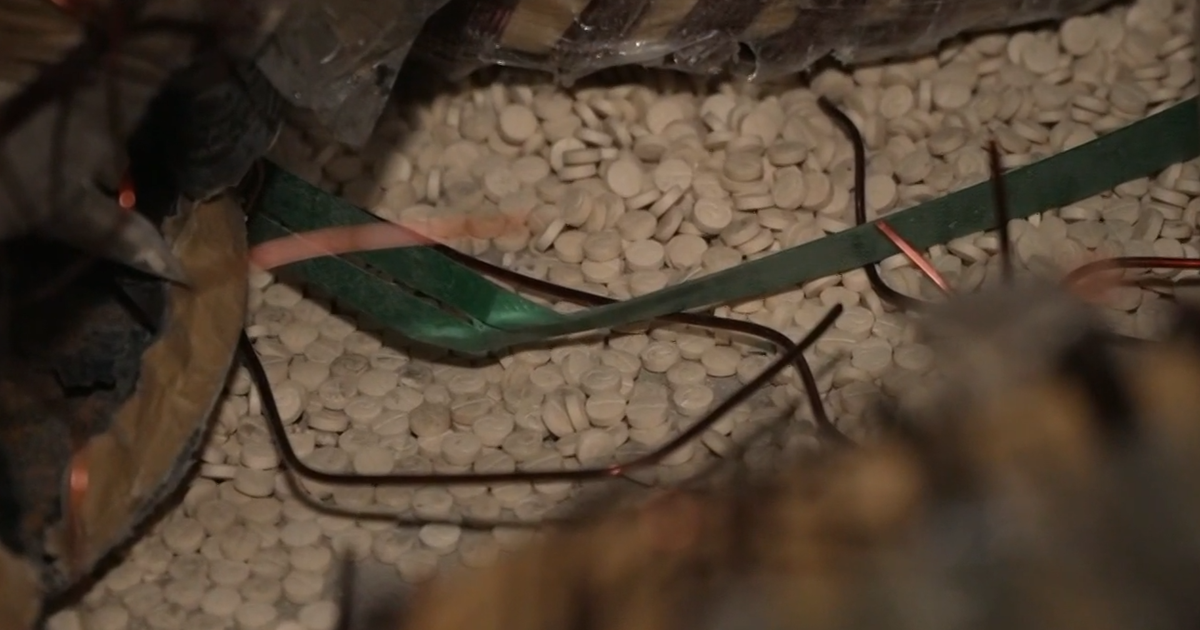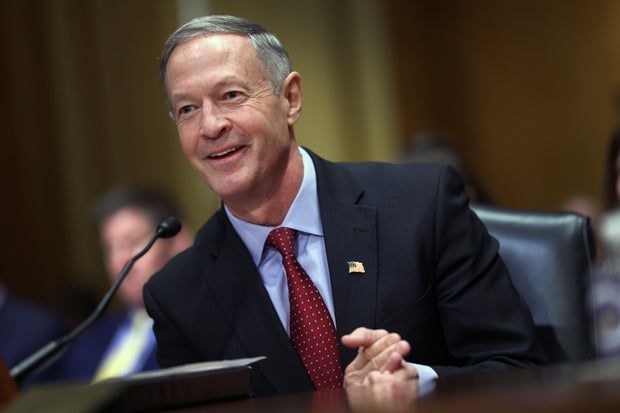CBS News
Iran-backed group claims strike on Syria base used by U.S. as Israel-Hamas war fuels risky tit-for-tat

Erbil, Iraq — An Iran-backed militia group in Iraq claimed responsibility Monday for a drone strike against a base in eastern Syria used by U.S. troops that killed six American-allied Kurdish fighters. The attack, which caused no American casualties, appeared to be the first significant response from what the U.S. calls Iran’s proxy groups to U.S. airstrikes against the militias in the region.
On Friday, the U.S. started striking the militias of an umbrella group known as the Islamic Resistance in Iraq in response to those groups’ stepped-up attacks on U.S. bases in the region — including the deadly drone strike on a base in Jordan that killed three U.S. service members on Jan. 28.
The Kurdish-led Syrian Democratic Forces said Monday that a drone struck a training ground the previous night at the al-Omar base in Syria’s eastern province of Deir el-Zour. The SDF trains commandos there, and some of the roughly 900 U.S. troops deployed in Syria as part of the ongoing mission against ISIS have been based there.
The Islamic Resistance in Iraq released a video claiming responsibility for the attack that included purported images of the drone being launched from an unspecified location.
With its strikes over the weekend against the militias in Iraq and Syria — and ongoing strikes against the Houthi rebels in Yemen who’ve been targeting ships in the Red Sea for months — the U.S. has continued its retaliation against Iran’s affiliates across a wide geographical area. All those groups say they’ve been attacking U.S. and Israeli interests in solidarity with Palestinians, as Israel continues its war against Hamas, which is also backed by Iran, in the Gaza Strip.
The U.S. and the U.K. launched strikes against 36 Houthi targets late Saturday, targeting missile launch and radar systems in the large portion of Yemen controlled by the Shiite Muslim rebels.
The Houthis’ slogan includes calls for “death to America” and “death to Israel.” The group vowed the strikes would “not go unpunished,” and just hours later, U.S. forces said they had hit several Houthi cruise missiles that were prepared to launch against ships in the Red Sea, where American military vessels are currently deployed.
The Houthis receive the bulk of their equipment and funding from Iran, according to the U.S. government.
The strike to take out the Houthi cruise missiles — one of several preemptive strikes in Yemen by U.S. and U.K. forces in recent weeks — came just a day after the U.S. said it had struck 85 targets in Iraq and across the border in Syria. Those strikes were retaliation for the deadly attack on the American soldiers just over a week ago in Jordan, and President Biden has vowed to continue retaliating against the militias as and when the U.S. military sees fit.
The U.S. has reported around 170 attacks against American forces in this region by Iran-backed groups since the Israel-Hamas war was ignited by the Palestinian militant group’s brutal Oct. 7 terror attack on southern Israel.
Iran has repeatedly denied any role in the increasing violence and when CBS News interviewed the country’s foreign minister in November, he rejected the notion of Iran having proxy groups and said the militias in Iraq and Syria attacking U.S. interests had “made their own decisions.”
Top officials in both the U.S. and Iran have said they don’t want the war between Israel and Hamas to widen and engulf the region. But the groups backed by Iran have vowed to continue retaliating against Israel and its closest ally, the U.S., for what they say is an unjust war in Gaza, and the U.S. has vowed to continue retaliating for any attacks by those groups that put Americans in harm’s way.
AHMAD AL-RUBAYE/AFP/Getty
In addition to the roughly 900 American forces deployed in Syria, there are about 2,500 in Iraq. So, preventing any further escalation of the conflict in such a tense region with so many potential flashpoints will require a very delicate balance, in both words and actions.
CBS News
DNC chair candidate Martin O’Malley says Democrats need to learn from “very bad loss”

Kevin Dietsch / Getty Images
Martin O’Malley has the kind of experience that would typically benefit a Democrat who wants to guide the party’s future after devastating losses in the last election.
He’s a former governor, former mayor and a 2016 presidential candidate who until recently was serving in President Joe Biden’s administration. Yet O’Malley is facing a difficult path in the race to try and become the next chairman of the Democratic National Committee as the party reckons with the reality that key pockets of voters turned against it.
Vital to O’Malley’s attempt is a campaign platform, first reported by CBS News, that calls for reconnecting the Democratic Party “to the kitchen table of every American family.”
“We suffered a very bad loss,” O’Malley said in an interview, urging Democrats “to learn from it in order to win the next battles ahead.”
His vision is centered on a 57-state and territory strategy along with plans to give campaigns “world-class AI tools for voter outreach, research, communications, and financial management, eliminating barriers to effective campaigning.” O’Malley’s pitch is also focused on “re-investing in direct voter registration,” as part of his pledge for the party to make “voter protection and registration the pillars of the change we need to win.”
Democrats weathered a chaotic election cycle in 2024, punctuated by the push within the party to convince President Biden to end his reelection run after a dismal debate performance in June. While Mr. Biden eventually ended his bid in July and endorsed Vice President Kamala Harris to take his place at the top of the ticket, the 107-day sprint that followed resulted in Democrats losing the White House and Senate while failing, albeit narrowly, to win control of the House.
Now the party is essentially leaderless and preparing for an emboldened Donald Trump to return to Washington, where he’ll be able to benefit from Republicans’ unified control of Congress and the White House. Those dynamics will be well in play at the time of the election for DNC chair on Feb. 1 given the unease among Democrats that has been abundantly clear in the weeks following the presidential election.
“I want to see someone who doesn’t come from the Washington circuit, who actually has been out there in the tissue of the country,” Ohio Rep. Marcy Kaptur, a battleground district Democrat, said of the DNC chair race.
Failure can mean opportunity. The party’s struggles means O’Malley, as well as other ambitious Democrats, have a chance to become the next chair and carry wide ranging influence during a critical time for the party as it looks to regain ground in the 2026 midterms and the 2028 presidential election. For all his apparent vulnerabilities, Trump was far more successful in this election than ever before, winning all seven presidential battlegrounds. Whether what happened in 2024 will become a tangible turning point for Democrats is likely to loom over the chair race in the coming weeks.
“That’s the big shift that’s happened with this election going the wrong way on us,” O’Malley said. “We’re now in a mode of needing a changemaker, not a caretaker.”
Among those running for chair, Ken Martin, the leader of Minnesota’s arm of the Democratic Party and a DNC vice chair, as well as Wisconsin Democratic Party Chair Ben Wikler, are seen as frontrunners. Martin has deep relationships within the DNC and can boast a statewide winning streak for candidates in Minnesota, while Wikler carries the political gravitas of helping lead the party in one of the nation’s seven presidential battlegrounds.
Earlier this month, Martin announced a framework which includes his drive for a “Democratic infrastructure in all 3,244 counties,” across the country, as well as taking on the branding problem evident from the 2024 election results.
“The majority of Americans now believe the Republican Party best represents the interests of the working class and the poor, and the Democratic Party is the party of the wealthy and the elites,” Martin said in his framework. “It’s a damning indictment on our party brand. We must be willing to dig deep and recenter the Democratic agenda to unite families across race, age, background, and class.”
During a brief pitch to party leaders at a meeting in Washington D.C. last week where Martin and O’Malley also spoke, Wikler told his fellow Democrats “we need to build the battle plan to change how we communicate, so we show what we mean when we say we fight for working folks.”
This isn’t the first time O’Malley has been linked to leading the party. Days after the 2016 election, he posted on social media that despite encouragement, he would not run for chair. Eight years later, he’s navigating a short window to make his case as he emphasizes his lengthy career in politics.
O’Malley served as mayor of Baltimore from 1999 to 2007 and went on to win two terms as governor of Maryland, which included a stint leading the Democratic Governors Association. His political power has faded since then however, illustrated most notably by the struggles he faced during his campaign for president in the 2016 Democratic primary. Before announcing his run for chair, O’Malley spent nearly a year working in the federal government as commissioner of Social Security.
That experience is intertwined in O’Malley’s platform, which also calls for creating “a feedback loop for our local and state elected officials to ensure that they can help inform our messaging and tactics.”
“We all know we need to restore our credibility,” O’Malley said. “We need to learn from our failings, as well as our candidates who succeeded. But only one of us [in the race for DNC chair] has actually proven an ability to effectuate a rapid turnaround like we need to do right now in order to win the next election.”
contributed to this report.
CBS News
Biden sets new climate goal for slashing U.S. greenhouse gas emissions

In the final days of his administration, President Biden has set a new climate goal for slashing U.S. greenhouse gas emissions. However, it comes as his successor, President-elect Donald Trump, has signaled he is not interested in global climate negotiations.
The U.S. formally submitted its new goal Thursday to the United Nations. It calls for a 61% to 66% reduction in net greenhouse gas emissions by 2035 compared to 2005 levels, the White House said, with an overarching goal of achieving net zero emissions by no later than 2050.
The new goal is part of the Paris Agreement, under which member nations must update their emission cut targets — known as Nationally Determined Contributions, or NDCs — every five years.
The Paris accord requires countries to set voluntary targets for reducing greenhouse gases such as carbon dioxide. The only binding requirement is that nations accurately report on their efforts. First signed in 2016 by nearly 200 nations, it seeks to limit global warming to no more than 1.5 degrees Celsius above pre-industrial levels.
The new climate commitment “marks an ambitious capstone to President Biden’s climate legacy,” the White House said in a news release, adding that it will help grow a new clean energy economy focused on investment, innovation, and jobs.
“The United States’ new climate commitment offers a clear path forward for states, cities, businesses, and other leaders dedicated to ramping up action over the next four years,” said Debbie Weyl, U.S. acting director for the nonprofit environmental group the World Resource Institute, in a statement. “Even though the Trump administration may not lift a finger to deliver on this plan, it sets a north star for what the U.S. should be aiming for and could help guide the federal government’s priorities once Trump leaves office in 2029,” Weyl said.
In 2017, then-President Trump announced he was withdrawing the U.S. from the Paris Agreement, a process which took until nearly the end of his first term to complete. However, Mr. Biden fulfilled a campaign vow by rejoining the Paris Agreement on the first day of his own administration in early 2021.
Trump has long championed the fossil fuel industry, questioned the science of climate change and weakened other environmental protections.
This year, his campaign said Trump would pull the U.S. from the Paris Agreement a second time.
Last month in Azerbaijan at the annual United Nations climate summit known as COP29, participants adopted a $300 billion annual deal that will go towards helping developing countries wean themselves off coal, oil and gas, and help them adapt to future warming and pay for the damage caused by climate change’s extreme weather.
Mary Cunningham and
contributed to this report.
CBS News
Gisèle Pelicot’s husband found guilty in mass rape trial in France

A judge in France on Thursday found the former husband of Gisèle Pelicot, who admitted to drugging and raping her repeatedly over the course of almost a decade and inviting dozens of other men to assault her as well, guilty of aggravated rape. Over the course of her trial, Pelicot — who insisted her full name be published and proceedings be made public — has been praised for her courage and become a symbol of the fight against sexual violence in France and around the world. The judge on Thursday was reading out verdicts for dozens of other men also accused of raping her.
Pelicot arrived Thursday at the court in Avignon, southeast France, where crowds had gathered outside holding signs saying: “Thank you for your courage.”
The trial began on Sept. 2, and almost every day, Pelicot came face to face with her former husband, Dominique, or one of the 49 other men charged with raping her. One other man faced a charge of aggravated sexual assault. She insisted that videos submitted as evidence, made by her ex-husband showing men sexually assaulting her while she appeared to be unconscious, be shown in open court.
The assaults took place between 2011 and 2020, when Dominique Pelicot was taken into custody. Police found thousands of photos and videos of the abuse on his computer drives, which helped lead them to other suspects. Some of the men testified they thought the unconscious woman was OK with it, or that her husband’s permission was enough.
“Gisèle Pelicot thinks that this shock wave is necessary, so that no one can say after this: ‘I didn’t know this was rape,'” her attorney, Stéphane Babonneau, told The Associated Press.
“It’s not for us to feel shame — it’s for them,” Pelicot said in court, referring to the attackers. “Above all, I’m expressing my will and determination to change this society.”
Controversial French laws
Pelicot’s case triggered protests across France, and there was hope among some demonstrators that the case could lead to changes in controversial French laws governing sexual consent.
France introduced a legal age of sexual consent in 2021 after a public outcry over the rape of an 11-year-old schoolgirl by a man who was initially convicted on a lesser charge. Since then, sex with anyone under the age of 15 has been viewed as non-consensual, but French law does not refer to consent in cases involving older victims.
Under French law, rape is defined as penetration or oral sex using “violence, coercion, threat or surprise,” without taking consent into account, according to the Reuters news agency. Prosecutors must, therefore, prove an intention to rape if they are to be successful in court, legal experts told Reuters.
Just 14% of rape accusations in France lead to formal investigations, according to a study by the Institute of Public Policies.
“Why don’t we manage to obtain convictions? The first reason is the law,” legal expert Catherine Le Magueresse told Reuters. “The law is written in such a way that victims must comply with the stereotype of a ‘good victim’ and a ‘true rape’: an unknown attacker, use of violence, and the victim’s resistance. But it is only true for a minority of rapes.”
“I’m trying to understand”
Speaking in court during the trial, Pelicot, who is 72, talked about how she had thought she was in a loving marriage with her husband and would never have guessed that he was drugging her.
“We would have a glass of white wine together. I never found anything strange about my potatoes,” Pelicot told the court.
“We finished eating. Often when it’s a football match on TV, I’d let him watch it alone. He brought my ice cream to my bed, where I was. My favorite flavor — raspberry — and I thought: ‘How lucky I am. He’s a love.'”
She said she didn’t have any sensation of being drugged.
“I never felt my heart flutter. I didn’t feel anything. I must have gone under very quickly. I would wake up with my pajamas on,” Pelicot told the court, adding that she would sometimes wake up “more tired than usual, but I walk a lot and thought it was that.”
“I’m trying to understand,” she said, “how this husband, who was the perfect man, could have got to this.”










